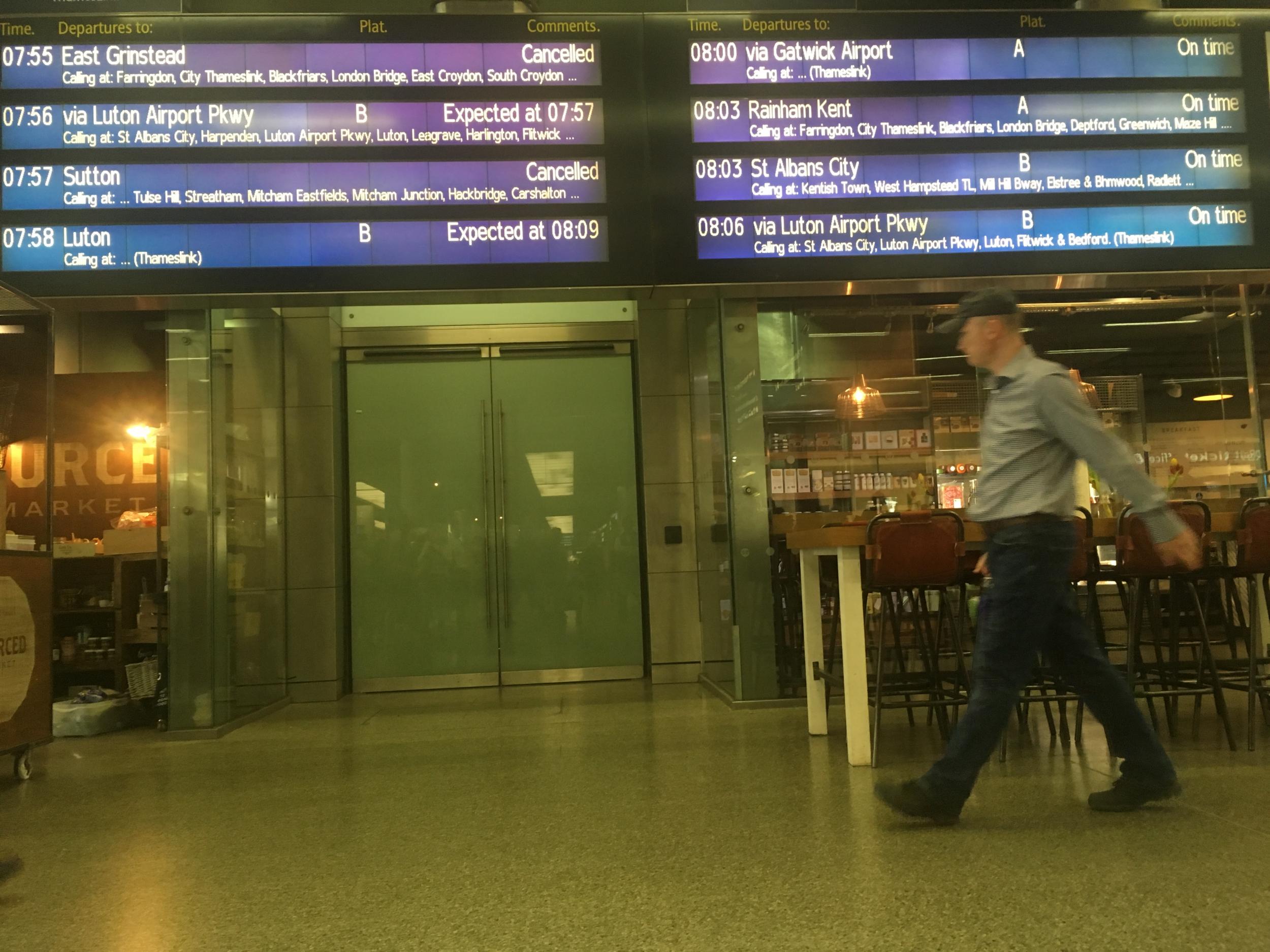Tens of thousands of commuters face weeks of disruption after botched rail timetable overhaul
‘Meltdown Monday’ likely to be followed by 'terrible Tuesday'

Your support helps us to tell the story
From reproductive rights to climate change to Big Tech, The Independent is on the ground when the story is developing. Whether it's investigating the financials of Elon Musk's pro-Trump PAC or producing our latest documentary, 'The A Word', which shines a light on the American women fighting for reproductive rights, we know how important it is to parse out the facts from the messaging.
At such a critical moment in US history, we need reporters on the ground. Your donation allows us to keep sending journalists to speak to both sides of the story.
The Independent is trusted by Americans across the entire political spectrum. And unlike many other quality news outlets, we choose not to lock Americans out of our reporting and analysis with paywalls. We believe quality journalism should be available to everyone, paid for by those who can afford it.
Your support makes all the difference.A key metric used by the railway industry is “tph” – trains per hour. Tens of thousands of commuters left standing on the first working day of the new train timetables were more concerned by “cph” – cancellations per hour.
At London St Pancras, the station at the heart of the changes in southeast England, 11 trains were cancelled in the key 8am to 9am hour, and a further eight from 5pm to 6pm. Between them, that represents around 20,000 seats which were unavailable to passengers heading for Peterborough, Brighton, Cambridge and Horsham.
In northwest England, the cancellation count was lower – just five trains in the 5pm-6pm schedule, thwarting journeys to Preston, Manchester Airport and Blackpool – but delays extended to half-an-hour or more.
While many commuters enjoyed an excellent start to the week, thanks to more resilient and realistic timetabling on many lines, tens of thousands of passengers have had a miserable Monday and are dreading an equally terrible Tuesday.
Even as the cancellations at St Pancras multiplied, Thameslink’s Twitter feed was telling anyone who asked that “an operational incident” was responsible for the fact that they would be home an hour late.
The reality, both in the Southeast and Northwest, was that the train operators do not have enough trained drivers to operate the new pattern of services.
Both Northern and Govia Thameslink Railway (GTR) are pointing a finger at Network Rail, saying that the infrastructure provider had not given them sufficient time to get their ducks in a row.
“We have over 400 drivers that operate on the Blackpool North route and all of them need to be retrained after the engineering work, which finished four weeks later than planned,” Northern told one customer.
No-one would dispute that the train firms, egged on by the Department for Transport, had set their sights extremely high.
The work that has been going on at huge expense to the taxpayer in the Southeast and the Northwest will prove to be a valuable investment to extract more capacity from a Victorian railway network, providing more resilient schedules, increased frequencies and a higher chance of a seat, and in many cases faster journeys.
But as with the botched opening of Terminal 5 at Heathrow a decade ago, it appears that the managers involved did not raise concerns in time to take remedial action, and instead crossed their fingers and hoped it would be all right on the night.
As with Terminal 5, a similarly ambitious “big bang”, it became clear before 6am that the wheels were falling off – three trains in a row from East Croydon to London Bridge, a key commuter link, were cancelled.
If, a week ago, the train operators had said that they would have to work to an emergency timetable with perhaps one in three trains cut, commuters would have grumbled but at least have avoided last-minute cancellations.
Robert Nisbet, regional director at the Rail Delivery Group, which represents the rail industry, said: “Retiming over 100,000 services is a huge operational challenge.” The travelling public understands that, and also that plans can unravel. But the earlier the misfortune is relayed, the sooner they can make alternative arrangements.
GTR and Northern would be well advised to deliver all the remaining bad news immediately.
The train operators were always going to get a kicking from commuters in the relatively few towns which have been dealt a demonstrably worse hand of rush-hour trains, such as Harpenden in Hertfordshire and Redhill in Surrey. Meltdown Monday has incensed a much wider audience.
Join our commenting forum
Join thought-provoking conversations, follow other Independent readers and see their replies
Comments